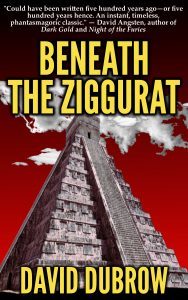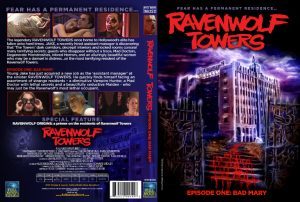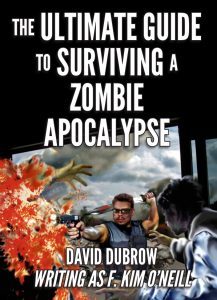David Dubrow's Blog, page 26
January 24, 2017
Book Review: Chrysalis
 Ray Zacek’s short story Chrysalis packs a lot of plot into a brief package. It releases its disturbing secrets slowly, inch by inch, line by line, and by the time Zacek has opened the kimono all the way, you’ll be ready to run screaming.
Ray Zacek’s short story Chrysalis packs a lot of plot into a brief package. It releases its disturbing secrets slowly, inch by inch, line by line, and by the time Zacek has opened the kimono all the way, you’ll be ready to run screaming.
Coffman, the protagonist, is as much a cipher as the mystery he’s driven into the dilapidated town of Leclerc to investigate: who, exactly, does he work for? And why are the bodies in this “Somalia on the Mississippi” piling up? As the story unfolds and things get weirder, the unflappable, enigmatic Coffman seems equal to the challenge…until he isn’t.
Zacek’s talent for snappy dialogue, ably demonstrated in his short story The Tatman, is in evidence here: everyone’s got a reason for what they say and how they say it, which is the essence of good characterization. Secret agendas lurk behind every exchange, adding to the atmosphere.
If I have any complaints, it’s that the story’s too short. Zacek hints of greater things afoot, but we don’t get to see them. Which is a shame, because this is a world you’ll definitely want to return to. Let’s hope the author’s got more Chrysalis stories coming down the pike…or in this case, sliding out of a morgue’s chilly drawer.
At the time of this writing, Chrysalis is free on Amazon. Get your copy ASAP!







January 19, 2017
You Deserve Better Than Star Dreck
 My newest piece for The Loftus Party discusses the two largest science fiction franchises still in business: Star Trek and Star Wars:
My newest piece for The Loftus Party discusses the two largest science fiction franchises still in business: Star Trek and Star Wars:
The reboot of the Star Trek movie franchise is horrible. Absolutely horrible. The reimagined characters lack the discipline, integrity, and charm of the originals. Nichelle Nichols’ Uhura was brave, beautiful, and competent in a way that made her character realistic. Zoe Saldana’s Uhura is a man in a dress who kicks alien ass and bangs Vulcans. The first reboot film was only watchable because it had Leonard Nimoy in it. The second was an appalling Truther allegory that wasted the potentially frightening character of Khan. And the third, Star Trek Beyond, was incomprehensible, with an antagonist that made no sense in anything he did, a plot that was thinner than truck stop toilet paper, and a series of unfunny joke lines that masqueraded as dialogue.
This piece will make you angry…about the truth. Click to become offended and enlightened all at once.







January 17, 2017
Book Review: The Chicken (or 3 Weird Tales)
 At The Slaughtered Bird, I reviewed Hildred Rex’s anthology The Chicken (or 3 Weird Tales):
At The Slaughtered Bird, I reviewed Hildred Rex’s anthology The Chicken (or 3 Weird Tales):
The first story, A Slinking Agent of the Devil (at 3AM), transports the reader to the heat and sweat and tumult of post-World War One New Orleans, when only jazz could keep the dreaded serial murderer the Axman at bay. Rex doesn’t shy away from the lingo, mores, or general attitude of the time, which puts him head and shoulders above those writers who either sanitize the era’s casual racism to appeal to a broader, virgin-eared audience, or exaggerate it to establish the writer’s own moral bona-fides. Gory and gritty if not entirely suspenseful, it’s a fun story.
Is the rest of this chicken a dish you want to dig into? Click to find out!







January 12, 2017
Beneath the Ziggurat: The Rest of the Story
 Whenever I have to make one of those dumb lists of all-time favorite books I’ve ever read, Gary Jennings’s Aztec usually finds itself in the top five. I found the novel in my parents’ bookshelf in the late 1980’s: it was a huge, white hardback tome, utterly different from the Leon Uris, Lawrence Sanders, and Philip Roth novels that surrounded it. At the time I was in a dry spell between Stephen King and Clive Barker books, so I turned to the first page and fell completely inside.
Whenever I have to make one of those dumb lists of all-time favorite books I’ve ever read, Gary Jennings’s Aztec usually finds itself in the top five. I found the novel in my parents’ bookshelf in the late 1980’s: it was a huge, white hardback tome, utterly different from the Leon Uris, Lawrence Sanders, and Philip Roth novels that surrounded it. At the time I was in a dry spell between Stephen King and Clive Barker books, so I turned to the first page and fell completely inside.
(What’s funny is that my dad, whose book it was, didn’t even like it very much.)
Aztec sparked an interest in historical fiction and pre-Columbian history that continues to this day. As a completist, I had to get the entire Jennings oeuvre: Spangle, The Journeyer, Raptor, Aztec Autumn. And thence to Mika Waltari’s The Egyptian, and…you know how it goes. You ever read something in a new genre that’s so good that it spoils you, and nothing else can quite compare? That’s what happened with me and Aztec. Mary Renault, James Michener, Bernard Cornwell: they’re great, but not Jennings great. Except for Ken Follett.
A couple of years ago, when I was momentarily stalled on the first draft of The Nephilim and the False Prophet, I found an ad from a publisher looking for horror-themed short stories. The story criteria intrigued me with one caveat, so I outlined the bare bones of what would become Beneath the Ziggurat: a Lovecraftian tale of pre-Columbian Mexico. The caveat wasn’t that troubling: the publishers specifically encouraged white men to submit stories, and I fit the bill, so I was a shoe-in.
Or so I thought. As it turned out I got a nice rejection letter, saying that the story wasn’t quite what they were looking for.
Obviously that’s a disappointment, but you swallow it and move on. I shelved the story for the time being and finished The Nephilim and the False Prophet. A year later I gave the story in a non-exclusive format to Jasper Bark as electronic bonus content for his graphic novel project Beyond Lovecraft; the lucky people who donated a certain amount to Beyond Lovecraft‘s Indiegogo campaign will get to read it in PDF form once it’s out.
I always thought it was too good a story to bury or let languish, despite its earlier rejection, so I decided I would release it as a Kindle Single, with an original cover. And, well, there you have it-
Huh. Wait. Going over what I just wrote, I found I made an embarrassing typo. When I said that the publisher specifically encouraged white men to submit stories, I erred. The publisher had actually made it a point to encourage women and people of color to submit stories.
That’s racism. When a publisher tells you that it’s encouraging people of a certain skin color to submit work, they’re acting on a racist impulse. And now that we’re in a culture that has redefined gender as a “social construct,” it doesn’t matter who’s a man and who’s a woman: it matters what sex you say you are. How you identify. So sexism’s no longer a thing, right? I’m not sure. The rules are so plastic.
Somehow it’s become acceptable to discriminate against white people, particularly white men. Check out this post, written close to two years ago: our culture has somehow devolved since then. Writing off an individual because of immutable, innate characteristics like skin color is the essence of racism, whether that individual’s a white man or not.
If you’re at all interested in stopping racial or gender discrimination, don’t write stories for publishers who consider skin color or sex organs in their submission criteria. Don’t read stories from these publishers. Don’t do business with racists and sexists.
I’d have preferred to just talk about my love of pre-Columbian history and Gary Jennings, but when things like racial discrimination turn up, I have to address them. If you sit back and say nothing you’re accepting it, tacitly or otherwise. Discrimination against people of any skin color or ethnicity is wrong, and it’s ludicrous for me to have to point this out. But that’s what’s happening to our culture, including the publishing industry.







January 10, 2017
In Defense of Boycotts
 At The Loftus Party, I wrote a piece about boycotts:
At The Loftus Party, I wrote a piece about boycotts:
Boycotts are ridiculous except when they’re not. How do you explain not wanting to see Florence Foster Jenkins because Meryl Streep gave a stupid anti-Trump speech at the Golden Globes? Do you really care what she says? What about the Target boycott? Or the Kellogg’s boycott? Where do the boycotts end? Don’t you just want to live your life and save your mental energy for things that actually matter, like where to send your kids to college or whether to order the onion rings or the French fries with that bacon cheeseburger?
Yes…and no.
Click to read the rest, and then boycott this site!
Well, maybe not the last part.







January 9, 2017
New Kindle Single: Beneath the Ziggurat
 I’ve released a new short story, available on Kindle: Beneath the Ziggurat. It’s a Lovecraft-inspired tale that takes place in pre-Columbian Mexico, not long after the fall of the Aztecs at the hands of the Spanish:
I’ve released a new short story, available on Kindle: Beneath the Ziggurat. It’s a Lovecraft-inspired tale that takes place in pre-Columbian Mexico, not long after the fall of the Aztecs at the hands of the Spanish:
Beneath the Ziggurat takes the reader on a Lovecraftian journey through pre-Columbian Mexico, where dread lurks behind every step of rainforest and the old gods still hold terrible sway. Descend into a nightmare of brutal Spanish conquistadors, bizarre aboriginal tribes, and unspeakable alien horrors in a tale that David Angsten, author of Dark Gold and Night of the Furies lauded as “an instant, timeless, phantasmagoric classic.”
Jason Berry of The Mad Ravings of an Entertainment Junkie said of it, “I honestly do not see a way that this story could be improved – it is that good!”
It’s available right now from Amazon, so pick up your copy today!







January 5, 2017
Slaughtered Bird Review: Ravenwolf Towers, Episode 1
 I reviewed episode 1 of Charles Band’s serial program Ravenwolf Towers at The Slaughtered Bird:
I reviewed episode 1 of Charles Band’s serial program Ravenwolf Towers at The Slaughtered Bird:
Ravenwolf Towers, a serial program, is the latest offering from Charles Band’s indispensable Full Moon Features production company. Horror fans young, old, and in-between (like me) will remember Full Moon fondly from classics like the Puppet Master series, the Demonic Toys series, Dollman, Dollman vs. Demonic Toys (natch), The Gingerdead Man, and the Trancers series (my personal favorites), among many others.
Is it any good? What’s it about? Click to read on!







January 3, 2017
Book Review: Lagoon by Nnedi Okorafor
 Combining a half-baked species of magical realism with high-minded science fiction, Nnedi Okorafor’s Lagoon sits in an uneasy twilight of muddled themes that don’t quite coalesce into a coherent story. In many respects the novel serves as a love letter to a fictional Lagos, Nigeria, with sentient spiders, aquatic monsters, and magically-enhanced protagonists fighting for attention in the context of awakening gods and visiting space aliens. The novel shines brightest in its depiction of life in Lagos, a place that mingles middle-class wealth with desperate poverty, but is overshadowed by the huge cast of characters that do nothing to move the minimal plot along.
Combining a half-baked species of magical realism with high-minded science fiction, Nnedi Okorafor’s Lagoon sits in an uneasy twilight of muddled themes that don’t quite coalesce into a coherent story. In many respects the novel serves as a love letter to a fictional Lagos, Nigeria, with sentient spiders, aquatic monsters, and magically-enhanced protagonists fighting for attention in the context of awakening gods and visiting space aliens. The novel shines brightest in its depiction of life in Lagos, a place that mingles middle-class wealth with desperate poverty, but is overshadowed by the huge cast of characters that do nothing to move the minimal plot along.
Lagoon is an unusual sort of first-contact tale: an alien spacecraft appears in the ocean off the coast of Lagos, Nigeria, and three people are drawn to its arrival: Adaora, a marine biologist; Anthony, a rapper; and Agu, a soldier. Adding to the confusion of A-names, Adaora christens the alien they meet Ayodele. The rest of the novel is taken up with how the alien Ayodele interacts with people, how Ayodele intends to change the world, and how life in Lagos is altered by the event.
The antagonists are Chris, Adaora’s husband, who has recently found Christianity, and Chris’s priest, Father Oke. Father Oke follows the cliché of Christian clergy in fiction: greedy, occasionally violent, entirely without ethics. His influence on Chris is profound, turning Chris from a loving husband and father into an abusive, bull-headed monster. While Islam is also mentioned as a religious influence on Nigeria, you won’t find anything uncomplimentary said or implied of it in the novel; after all, it’s a lot safer to stigmatize Christians than Muslims.
When reading a book for review, I always avoid finding anything out about the author until after the book’s finished. My intent is to review the text, not the writer. Nnedi Okorafor is a communist, an out-and-proud Marxist, and this is made clear early on in the novel during an exchange with Chris and Father Oke:
Father Oke made the sign of the cross. This always calmed his parishioners down. Now was no exception. Chris instantly quieted and relaxed. “Trust in the Lord, Brother Chris….Go to bed. I will see you tomorrow.”
Sufficiently opiated by the words of his beloved priest, Chris felt better.
This term “opiated” brings to mind Karl Marx’s sort-of quote, “Religion is the opiate of the masses,” and Okorafor’s love of the destructive, anti-human philosophy of communism is also reflected in the words of the wise alien Ayodele, who says to the president of Nigeria, “You believe in Marxism, yet you are too powerless to enact it.” It’s the superintelligent alien’s version of the modern-day communist’s lament, “Communism works: it just hasn’t been tried properly yet.” While this isn’t a main theme of the novel, the anti-Christian nature of communism is a theme, and hence is worthy of comment.
I liked the pidgin dialect of the Lagosians, the “Face me, I face you” apartments, the peeks into the darker side of life in Lagos. At times Ayodele the alien seemed impatient, even sulky, which added some personality to an otherwise bland, all-wise, all-knowing superbeing. It’s just that the mix of African highway gods and underwater extraterrestrials didn’t do it for me; there wasn’t enough communication between them for the story to make sense. The novel just ended with nothing resolved, which added to the general lack of plot. It’s not that Lagoon needs a sequel to tie the disparate strands together: it needed an editor.
I’m always eager to read science fiction from other cultures, and I’m glad I got a glimpse into a fictional Nigeria with Lagoon. I just don’t know if I can recommend it.







December 29, 2016
2016: The Year in Review
 Every year has its ups and downs, but for me, 2016 has been mostly ups. My family’s healthy, I’m healthy, and I can still write. Nothing to complain about. Still, it’s interesting to look back on just what happened over the past year and see where I’ve been.
Every year has its ups and downs, but for me, 2016 has been mostly ups. My family’s healthy, I’m healthy, and I can still write. Nothing to complain about. Still, it’s interesting to look back on just what happened over the past year and see where I’ve been.
On January 14, I released the sequel to The Blessed Man and the Witch, titled The Nephilim and the False Prophet . Darker than Blessed Man, it continues the story of a Biblical apocalypse and reveals more of not just Hell’s plan for Armageddon, but also Heaven’s. The Watcher angels also play a significant role; after all, they did say they wanted to save humanity. On January 27, I interviewed R.M. Huffman , author of Leviathan: Book One of the Antediluvian Legacy. Dr Huffman’s a skilled writer and a thoroughly decent fellow, and I’m honored to call him a friend.
February 1 marked my first published article for a horror website called The Slaughtered Bird. It’s a site I’m proud to be associated with. On February 3, I wrote a piece on how not to get raped by immigrants in Europe. It included basic lessons in self-protection and made some people very angry. Any time you can make half-wits angry, you know you’ve done a good thing. On February 22, I wrote the most popular post on the blog: Red Flags and Ginger Nuts of Horror . It described how Jim Mcleod, owner of Ginger Nuts of Horror, kicked me off the site’s writing staff because I dared to express opinions about current events on my social sites. Opinions, by the way, that millions and millions of other people share. After kicking me off the site, he also called me, a Jewish man, a Nazi. At that point I pretty much stopped having anything to do with anyone closely associated with Ginger Nuts of Horror, a decision that has redounded to my personal and professional benefit many times over.
On March 9, a very kind reader named Judge Deadd compiled all the articles I had written on Ginger Nuts of Horror and archived them; Jim Mcleod deleted my articles from his site after kicking me off, thereby purging the Jew. On March 28, I wrote a piece in defense of Western civilization that I’m quite proud of. It included a trigger warning for those who find such things useful.
April was a busy month for the blog. On April 12 I wrote a piece on the North Carolina bathroom bill that got a lot of attention both here and where I cross-posted it at Liberty Island. It detailed the new front that the progressive left has opened up in the culture war: the redefinition of gender. Beginning April 18, I spent the week on the David A Riley/HWA fiasco , including critical analysis and an interview with Riley himself. It must be read to be believed, and I’m pleased that I was able to shine a light on SJW BS once again.
On May 16, I wrote about how I quit Facebook . It’s a decision I have not once regretted in the more than six months since. For all its dubious benefits, Facebook is a gigantic time-suck. I miss the family photos and drive-by birthday greetings from friends I haven’t heard from since the last drive-by birthday greeting, but quitting the service is a net plus no matter how you slice it. On May 27, I wrote another fairly popular post: Writers as Political Activists . It detailed the unbelievably stupid open letter writers like Stephen King and Amy Tan signed, telling people who they should vote for in the 2016 presidential election. As it turned out, their political activism failed.
June was the month of giveaways, and on June 6, I described how, through various marketing sites, I had given away over 3200 copies of The Blessed Man and the Witch. This significantly boosted sales of The Nephilim and the False Prophet, so the giveaway was very successful. On June 20, in the aftermath of the Orlando shooting by Omar Mateen, a Muslim extremist, I published a piece on how media coverage of the attack drove people apart rather than bringing them together.
My July 4 piece struck a chord with many Americans, as it focused on what American exceptionalism actually means, and it’s not chest-beating about how great America is. (Though there’s absolutely nothing wrong with that and people who do that sort of thing are awesome and should be respected.) On July 15, I discussed the Ghostbusters franchise reboot, showing how the new movie had become a social justice vehicle rather than a comedy/horror film. The reviews and social media efforts promoting the film reinforced that point.
On August 11 I wrote a letter to my formerly favorite department store, Target . It’s unfortunate that certain corporations have decided that virtue-signaling is more important than customer satisfaction, but that’s part of the world we live in now. Just remember than things weren’t like this not long ago, and keep in mind who’s been pushing a destructive, fringe agenda on an unwilling populace for quite some time. The season of weird cinema continued into late summer, and on August 25 I reviewed the movie Der Bunker .
On September 9 I wrote about the Mel Gibson movie Hacksaw Ridge and why I, as a Jew, wasn’t going to bother seeing it, or anything else Gibson made. I bookended the post with satirical commentary on what Jews really think and say. On September 27 I began an essay series on Fox’s new show The Exorcist, a series I would continue through the next several episodes.
I wrote a piece that was well-received on October 3 for the website Scifi and Scary called Let’s Bring Objective Morality Back to Horror . In it I argued that vampires and demons without God, or a force of absolute good, lacked punch. On October 19, I wrote my first piece for The Loftus Party called Getting Along is Not Going Along, where I argued against reducing individuals to their political opinions (a theme that has colored the entire year).
On November 1, I talked about the results of the giveaway of my novella Dreadedin Chronicles: The Nameless City. Marketing indie-published titles is a crapshoot in many respects, and I discussed what worked and what didn’t. I analyzed the presidential election returns on November 9, focusing on the reaction to the results .
On December 2, I wrote a piece about the latest outrage and discussed why you shouldn’t do business with people who go out of their way to tell you how much they hate you. And finally, on December 27, I announced the republication of my book The Ultimate Guide to Surviving a Zombie Apocalypse . The revised and updated edition has a new chapter, new illustrations, and plenty of new information to get you through the undead-caused end of the world.
Being the pseudo-intellectual social commentator that I am, I suppose I should opine on 2016’s rash of celebrity deaths. While I don’t typically share it, I understand the grief we feel when a beloved performer dies. For brief periods we experience, vicariously, dangers and terrors and passions and delights through their performances, so it’s only natural to grieve when they go. Particularly when they die before their time, like Carrie Fisher. Or unexpectedly, like David Bowie and George Michael. As you think about Princess Leia, I ask that you also spare a thought or prayer for my wife’s uncle Bill, who passed on in late August. A navy veteran who served during the Vietnam war, he was a good man, and we miss him still.
Bill, we’ll all meet again some day.
Early next year I’ll have a new Kindle Single published, and my goal is to complete the third and final novel in my Armageddon trilogy, to be titled The Holy Warrior and the Last Angel. Along with more book reviews, movie reviews, and other original articles. Here’s to 2017.







December 27, 2016
The Ultimate Guide to Surviving a Zombie Apocalypse: Revised and Updated
In late October of this year I reacquired the rights to my book The Ultimate Guide to Surviving a Zombie Apocalypse. Since then I’ve been working day and night to republish it in a revised and updated edition, featuring new illustrations and a new chapter on surviving the worst of the worst-case scenario: surviving a Zombie Apocalypse in a big city like Atlanta or Chicago.
 I’m proud to announce that this new version is available in paperback from Amazon, just in time for you to purchase with all that Christmas money burning a hole in your virtual pocket!
I’m proud to announce that this new version is available in paperback from Amazon, just in time for you to purchase with all that Christmas money burning a hole in your virtual pocket!
Let’s face it: most of us are not prepared to face a basic disaster survival situation, let alone a zombie uprising. What are you going to do when all the trappings of civilization are ripped away by rotting, undead hands? During a Zombie Apocalypse, the electricity stops running, water stops flowing from the tap, and the rule of law becomes the Law of the Jungle. Hordes of ravenous, cannibalistic ghouls roam the streets, seeking human flesh. It would be a miracle if you survive the first night, let alone a month. Your life expectancy has just dropped to next winter…if you’re lucky.
That’s where this book comes in. It provides you with not just the information you need to survive the coming Zombie Apocalypse, but the confidence such knowledge brings. After reading this book, you will learn:
The different classifications of zombies, along with their strengths and weaknesses
How to cope with the overall zombie-caused breakdown of society
Combat-proven zombie-fighting tactics and techniques
How to find food, water, and shelter in a zombie-overrun world
Skills for surviving other apocalyptic dangers, including rogue government agencies, zombie animals, and other humans competing for scarce resources
How to prepare a Zombie Bug-Out Bag to get you through that critical first week of the Zombie Apocalypse
And so much more!
Do you really want to be the only person on your block completely unprepared for the coming Zombie Apocalypse, or do you want to take your fate in your own two hands and not only survive, but thrive in a post-apocalyptic world filled with cannibalistic undead? Pick up your copy today!










